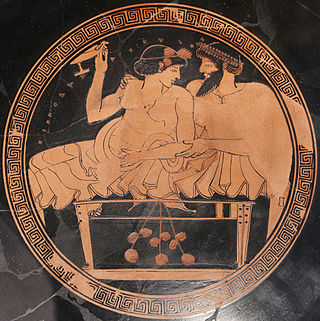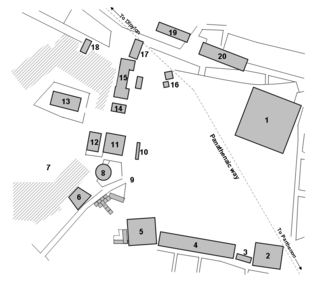
Debra Hamel is an American historian specializing in ancient Greece.

Debra Hamel is an American historian specializing in ancient Greece.
Hamel was born in 1964 in New Haven, Connecticut. She graduated from Johns Hopkins University in 1989 with a Bachelor of Arts degree in classics with departmental and general honors. Hamel studied at Yale University and graduated with an M.A. and M.Phil. in classical languages and literatures in 1993. She received her Ph.D. in 1996, with the dissertation Athenian Strategoi: The Extent and Exercise of Authority in the Military Sphere, 501/0-322/1 three years later. From 1998 to 2001 Hamel was Visiting Assistant Professor at Wesleyan University.
Debra Hamel's main topics are ancient Greek law and Greek military history. She has written several articles for the journal Military History Quarterly .
Hamel lives with her husband and her two daughters in North Haven.

Athena or Athene, often given the epithet Pallas, is an ancient Greek goddess associated with wisdom, warfare, and handicraft who was later syncretized with the Roman goddess Minerva. Athena was regarded as the patron and protectress of various cities across Greece, particularly the city of Athens, from which she most likely received her name. The Parthenon on the Acropolis of Athens is dedicated to her. Her major symbols include owls, olive trees, snakes, and the Gorgoneion. In art, she is generally depicted wearing a helmet and holding a spear.
Year 347 BC was a year of the pre-Julian Roman calendar. At the time it was known in Rome as the Year of the Consulship of Venno and Torquatus. The denomination 347 BC for this year has been used since the early medieval period, when the Anno Domini calendar era became the prevalent method in Europe for naming years.

A herma, commonly herm in English, is a sculpture with a head and perhaps a torso above a plain, usually squared lower section, on which male genitals may also be carved at the appropriate height. Hermae were so called either because the head of Hermes was most common or from their etymological connection with the Greek word ἕρματα, which originally had no reference to Hermes at all. The form originated in ancient Greece, and was adopted by the Romans, and revived at the Renaissance in the form of term figures and atlantes.

The Areopagus is a prominent rock outcropping located northwest of the Acropolis in Athens, Greece. Its English name is the Late Latin composite form of the Greek name Areios Pagos, translated "Hill of Ares". The name Areopagus also referred, in classical times, to the Athenian governing council, later restricted to the Athenian judicial council or court that tried cases of deliberate homicide, wounding, and religious matters, as well as cases involving arson of olive trees, because they convened in this location. The war god Ares was supposed to have been tried by the other gods on the Areopagus for the murder of Poseidon's son Halirrhothius.

A polemarch was a senior military title in various ancient Greek city states (poleis). The title is derived from the words polemos (war) and archon and translates as "warleader" or "warlord". The name indicates that the polemarch's original function was to command the army; presumably the office was created to take over this function from the king. The title held a high position in Athenian society, alongside the archon eponymos and the archon basileus. In Athens the polemarch was the commander-in-chief of the armed forces of the city-state.

A hetaira,, also hetaera,, was a type of courtesan or prostitute in ancient Greece, who served as an artist, entertainer and conversationalist in addition to providing sexual service. Custom excluded the wives and daughters of Athenian citizens from the symposium, but this prohibition did not extend to hetairai, who were often foreign born and could be highly educated. Other female entertainers made appearances in the otherwise male domain, but hetairai joined the male guests in their sexual joking, sometimes evidencing a wide knowledge of literature in their contributions.

Olynthus is an ancient city in present-day Chalcidice, Greece. It was built mostly on two flat-topped hills 30–40m in height, in a fertile plain at the head of the Gulf of Torone, near the neck of the peninsula of Pallene, about 2.5 kilometers from the sea, and about 60 stadia from Poteidaea.

In classical antiquity, the Arginusae were three islands off the Dikili Peninsula on the coast of modern-day Turkey, famous as the site of the Battle of Arginusae during the Peloponnesian War. They were also collectively referred to as Canaea after the city of Canae on the largest island. Today two of the islands remain, while the third and largest has become attached to the mainland as a promontory near the modern village of Bademli:
Ancient Greek laws consist of the laws and legal institutions of ancient Greece.
Pasion was a slave who rose to become a successful banker and Athenian citizen in Ancient Athens in the early 4th century BC.
Charicles, son of Apollodorus, was an ancient Athenian politician. In 415 BC he investigated the mutilation of the herms, and in 414/3 was made a general. In 411 Charicles became one of the Four Hundred, and he fled Athens after it fell; he returned in 404 and was one of the Thirty Tyrants. Along with Critias, he unsuccessfully forbade Socrates from speaking to men under the age of thirty. According to Aristotle he was one of the worst of the Thirty Tyrants.
Apollodorus of Acharnae in Attica was an Athenian politician known from several ancient forensic speeches which were preserved as part of the Demosthenic corpus. He was the son of Pasion, a wealthy banker who had been granted Athenian citizenship in thanks for the gifts he had made to the city of Athens.
Neaira, also Neaera, was a hetaera who lived in the 4th century BC in ancient Greece. She was brought to trial between 343 and 340 BC, accused of marrying an Athenian citizen illegally and misrepresenting her daughter as an Athenian citizen.

The Altar of the Twelve Gods, was an important altar and sanctuary at Athens, located in the northwest corner of the Classical Agora. The Altar was set up by Pisistratus the Younger, during his archonship, in 522/1 BC. It marked the central point from which distances from Athens were measured and was a place of supplication and refuge.

The study of the lives of women in classical Athens has been a significant part of classical scholarship since the 1970s. The knowledge of Athenian women's lives comes from a variety of ancient sources. Much of it is literary evidence, primarily from tragedy, comedy, and oratory; supplemented with archaeological sources such as epigraphy and pottery. All of these sources were created by—and mostly for—men: there is no surviving ancient testimony by classical Athenian women on their own lives.
Canae was, in classical antiquity, a city in ancient Aeolis, on the island of Argennusa in the Aegean Sea off the modern Dikili Peninsula on the coast of modern-day Turkey, near the modern village of Bademli. Today Argennusa has joined the mainland as the Kane Promontory off the Dikili Peninsula. Canae is famous as the site of the Battle of Arginusae in 406 B.C.
"Against Neaera" was a prosecution speech delivered by Apollodoros of Acharnae against the freedwoman Neaera. It was preserved as part of the Demosthenic corpus, though it is widely considered to be pseudo-Demosthenic, possibly written by Apollodoros himself. The speech was part of the prosecution of Neaera, a hetaera who was accused of unlawfully marrying an Athenian citizen. Though the speech claims that the case was brought for personal reasons, the date of the prosecution has led scholars to believe that it was in fact politically motivated. In common with most legal cases from ancient Athens, the outcome is unknown.

Gnathaena was an Athenian hetaira, a class of ancient Greek prostitutes who were companions to wealthy men. Though there is no source for either her date of birth or date of death, Gnathaena is known to have lived during the 4th century BCE due to her affiliations with various men of the era. Her most notable lover was Diphilus, an Athenian New Comedy playwright. According to Athenaeus, Gnathaena was famous for her lavish parties and witty repartee, and even wrote a treatise on proper conduct at her symposiums entitled, "Rules for Dining in Company".
Roel Konijnendijk is a Dutch historian known for his research on Classical Greek warfare and military thought. He is best known as the author of Classical Greek Tactics.
James Henry Oliver was an American ancient historian and epigrapher, especially notable for his work on Ancient Athens.